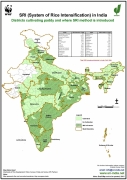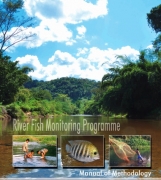Government Programmes
Accelerated Rural Water Supply Programme: CAG performance audit report (2008)
Posted on 12 Jul, 2010 01:18 AMThe performance audit report of the Accelerated Rural Water Supply Programme (ARWSP) for the period April 2002 to March 2007, conducted by the Comptroller and Auditor General (CAG), reveals numerous deficiencies in execution and implementation of works such as cases of time and cost-overrun, non-completion & delayed completion of works, non-functional & defunct works, delayed completion & non-completion of water quality mission projects, incorrect prioritization of works, wasteful and unfruitful expenditure, and expenditure on unapproved items.
Draft regulatory framework for wetlands conservation - Comments by ATREE
Posted on 09 Jul, 2010 11:49 PMThe Ministry of Environment and Forests released a draft of the regulatory framework for wetland conservation - Wetlands Conservation and Management Rules (2009) for feedback from all stakeholders. The draft framework was prepared by a multi-disciplinary expert group, and final round of comments were invited till June 21st 2010.
The Wetland Conservation Team of Ashoka Trust for Research in Ecology and the Environment (ATREE) did a detailed analysis of the draft regulation and submitted several pertinent concerns to the Ministry. The most significant observation is that the new framework (as do much of India's policies and laws) continues to propose unjustifiable State control and interventions over the country's wetlands and livelihoods of people dependent on them. The regulation does not make any constructive suggestions or recommendations for the conservation that the country's wetlands demand, and instead brings all wetlands into complete official control by installing Central, State and District-level wetland regulatory authorities, wherein the majority of the members will be senior government officials.
Renukaji Dilli Ke Nalon Mein - A documentary about the movement against the proposed Renukaji Dam Project
Posted on 18 Jun, 2010 05:22 PMThe Renuka Dam Project proposed over the river Giri Ganga (a tributary of the Yamuna) located some 300km away from Delhi, is a joint project of the governments of Himachal Pradesh (HP) and Delhi, to be constructed by the Himachal Pradesh Power Corporation Limited (HPPCL) in Sirmaur district of HP.

Need to bring focus of water & agriculture policies onto rainfed farming : SANDRP May '10
Posted on 18 Jun, 2010 11:03 AM![]()
The Dams, Rivers and People issue for Apr-May 2010 is out. The state government policies, programmes and practices in water resources and highlights the need to bring focus of water & agriculture policies onto rainfed Farming. It is likely to yeild better economic, hydrologic, sustainable, equitable and climate friendly results and foodgrains production as per our future demands.
System of Rice Intensification and Paddy Cultivation - Maps developed by the WWF-ICRISAT Project
Posted on 14 Jun, 2010 06:23 PM Paddy, one the country's staple crops is cultivated all over the country, barring parts of Jammu and Kashmir, Gujarat and Rajasthan. This set of interesting maps about Paddy and System of Rice Intensification (SRI) from the SRI India website, maintained by the WWF-ICRISAT Project (a joint initiative of WWF and ICRISAT), give a bird's eye view of the districts under Paddy and SRI Paddy cultivation, and the Paddy productivity in various districts of the country.
Paddy, one the country's staple crops is cultivated all over the country, barring parts of Jammu and Kashmir, Gujarat and Rajasthan. This set of interesting maps about Paddy and System of Rice Intensification (SRI) from the SRI India website, maintained by the WWF-ICRISAT Project (a joint initiative of WWF and ICRISAT), give a bird's eye view of the districts under Paddy and SRI Paddy cultivation, and the Paddy productivity in various districts of the country.
Districts with Paddy cultivation and where SRI approach has been introduced: Of the total 604 districts in India, paddy is cultivated in 564 districts. Of these, in 246 districts, SRI paddy cultivation approach has been introduced (data as of 2010). The spread of SRI has been most widespread in Uttarakhand, Eastern Madhya Pradesh, Orissa, Jharkhand, West Bengal, Andhra Pradesh, Tamil Nadu and Karnataka, as 50-95% of the districts in these regions/states have presence of SRI.
Irrigation management transfer in India: The processes and constraints - Paper by IRAP
Posted on 10 Jun, 2010 07:12 PMThe paper discusses the evolution of Participatory Irrigation Management (PIM) in India, following the felt need for better irrigation management to prevent water scarcity in many regions in the country.
The irrigation sector was identified as a priority area in the various policy reforms that took place in the water sector in the country.These reforms emphasised the importance of involving end users/farmers in the operation and management of irrigation conveyance systems.
This led to the establishment of the Farmers Managed Irrigation Systems (FAMIS), which aimed at improving the overall efficiency of the irrigation system, generate a sense of ownership among farmers and to improve the irrigation revenue recovery rate. This laid the seeds for Participatory Irrigation Management (PIM) in India.
Draft of “The Dam Safety Bill, 2010” approved
Posted on 08 Jun, 2010 06:24 PMAs per the Press Information Bureau's press release, the Union Cabinet has approved the proposal of the Ministry of Water Resources for enacting The Dam Safety Bill, on May 13 2010. The Bill is to be introduced in the Parliament.
The main objectives of the legislation are:-
• The new legislation will help the States in adopting uniform dam safety procedures which shall ensure safety of dams and safeguard benefits from such dams.
Dams on Himalayan rivers: How good is the science?
Posted on 08 Jun, 2010 05:38 PMThis brief article by Prof Jayanta Bandyopadhyay in the May 16-31 2010 issue of Business Economics magazine, highlights the recent plans of the central and state goverments of constructing a large number of dams on Himalayan rivers. Environmentalists continue to consistently argue against the construction of dams that are built without respect for ecological sciences and warn that this could lead to increase in disasters in the fragile Himalayan region.
River Fish Monitoring Programme - Manual of Methodology by Kerala State Biodiversity Board
Posted on 07 Jun, 2010 03:33 PM Measurement of riverine biota, particularly benthic macroinvertebrates (such as crustaceans and aquatic insects) and fish, has become a widely accepted method of identifying the structural or functional integrity and the overall health of a riverine system. This manual from the Kerala State Biodiversity Board (KSBB), describes in detail the field procedures to be followed in such fish monitoring/measurement surveys, conducted for riverine ecological systems.
Measurement of riverine biota, particularly benthic macroinvertebrates (such as crustaceans and aquatic insects) and fish, has become a widely accepted method of identifying the structural or functional integrity and the overall health of a riverine system. This manual from the Kerala State Biodiversity Board (KSBB), describes in detail the field procedures to be followed in such fish monitoring/measurement surveys, conducted for riverine ecological systems.
KSBB has taken up this manual publication effort, in the conxtet of a state-wide fish monitoring programme, that aims to survey all the 44 rivers of Kerala with the involvement of resource persons from local colleges, research institutes, experts and fisherpeople community.
Community initiative for efficient management of rural water supply in Assam
Posted on 06 Jun, 2010 10:18 PMDrinking Water Supply in rural areas of Assam ( India ) is managed by the Public Health Engineering Department (PHED), Government of Assam and the challenge is indeed enormous and achieving the targets requires well planned and strongly determined strategies and approach. Government has already formulated the necessary strategy to ensure sustained supply of safe drinking water in rural areas. However for achieving the desired end results from the Government initiatives, the community needs to be mobilized to own and sustain these programmes and to become an active partner in their implementation. For such a participatory demand driven approach, necessary awareness generation amongst the Community to realize the need for “total water security” and its impact on reduction of water borne diseases, is highly warranted.





